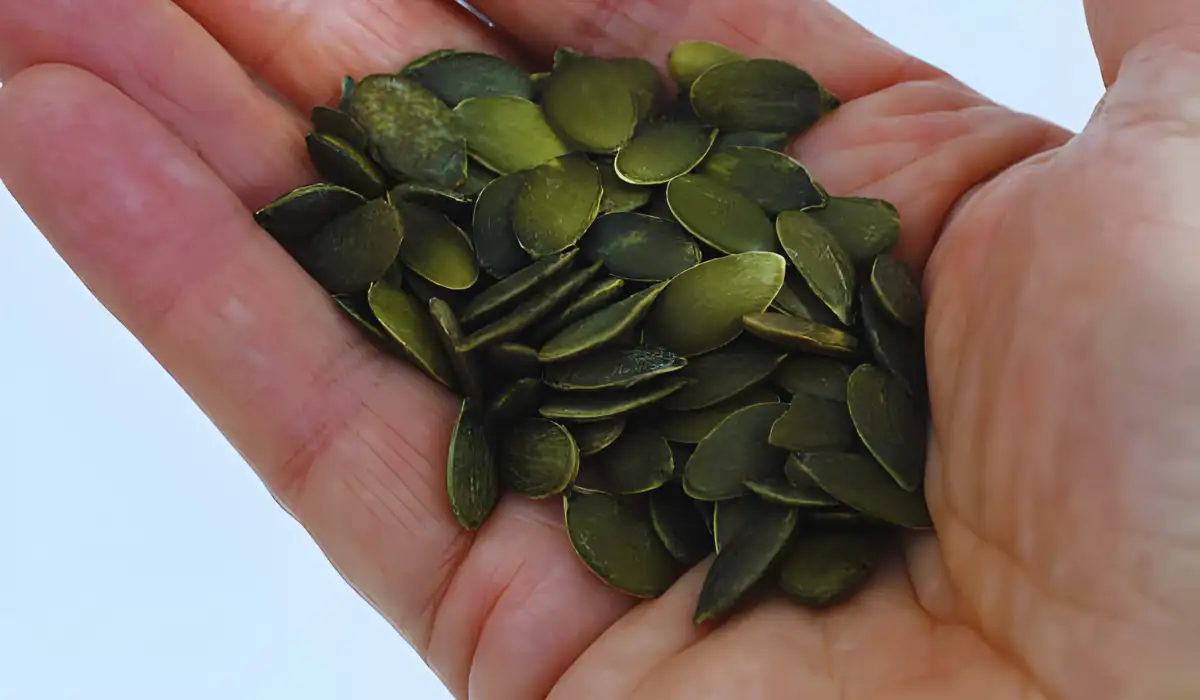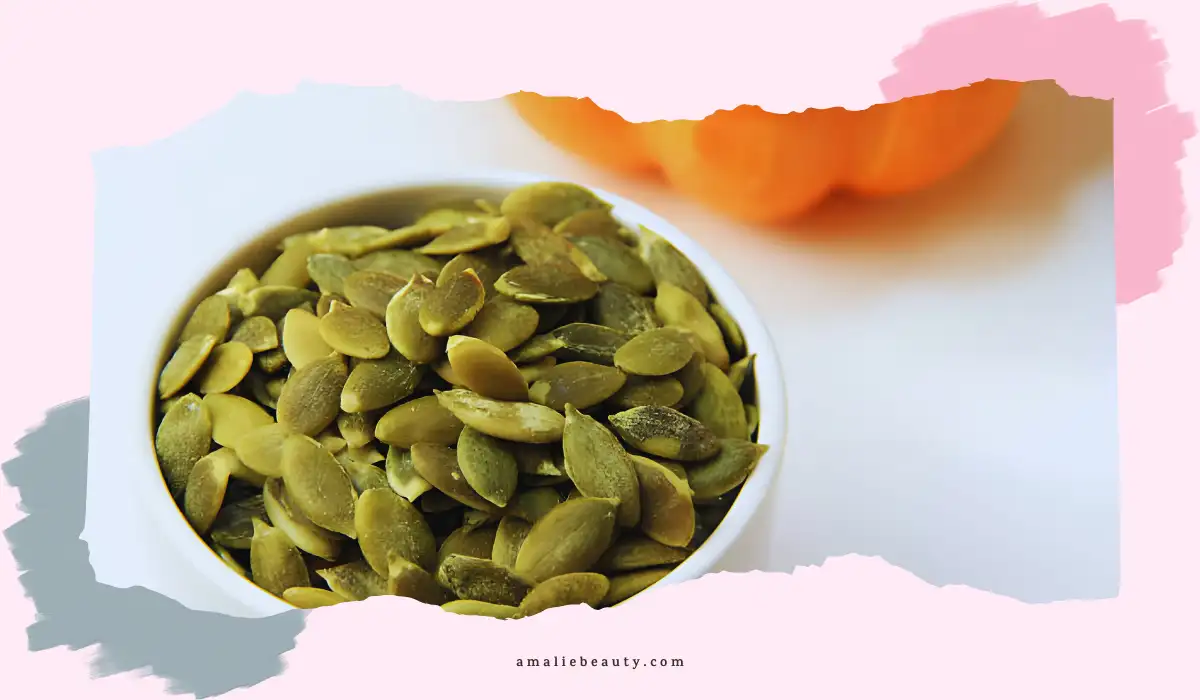The modern lifestyle and increasing pollution increasingly affect our hair, causing sufficient damage. As a result of that, within a short period, one loses the locks and the curls.
Among the natural remedies studied and tested in the present time, pumpkin seeds are getting much attention for their nourishing abilities to promote proper hair growth within a specific span of time. In the next few parts, we will be discussing this in detail.
The Nutrient Powerhouse Of Pumpkin Seed

Pumpkin seeds’ special nutrients benefit hair. These tiny seeds include zinc, magnesium, and vitamins A, C, and E. This mineral combination may improve health and hair growth.
Pumpkin seeds’ antioxidant vitamin E and cell-regenerating vitamin A work well together. These vitamins support hair follicles and health, which may impact strand growth and strength.
Zinc and magnesium increase pumpkin seed nutrition. Zinc builds and repairs cells, keeping hair follicles healthy. The body functions better with magnesium, which may increase hair growth.
What factors do pumpkin seeds support in promoting hair health?
👉 Zinc’s Hair-Boosting Role
Zinc, plentiful in pumpkin seeds, is essential for hair development. This mineral is crucial to hair health, affecting cellular development, repair, and function. Pumpkin seeds include zinc, which helps maintain healthy hair follicles, making them essential for strong, resilient hair.
Zinc facilitates complex cellular development and repair. Hair follicles need it to operate properly. Zinc supports hair health by encouraging cellular proliferation, which may affect each strand’s strength and vitality.
Proper zinc levels are crucial for hair loss prevention. Zinc is essential for hair follicle health, protecting against conditions that may cause hair loss. Maintaining zinc levels is like creating strong, durable hair.
👉 Omega-3 Fatty Acids for Scalp Health
Anti-inflammatory omega-3 fatty acids in pumpkin seeds benefit hair. Pumpkin seeds’ omega-3s may assist the scalp, which grows hair. Anti-inflammatory omega-3 fatty acids help maintain a healthy scalp, which may boost hair follicle activity.
Inflammation may disrupt scalp health, which is essential to hair growth. Pumpkin seeds are high in anti-inflammatory omega-3s. Anti-inflammatory action improves hair follicle conditions and addresses urgent concerns.
Reduce scalp irritation for hair health. Inflammation causes hair loss by disrupting growth. Omega-3s’ anti-inflammatory properties protect scalp integrity, preventing or treating hair growth difficulties.
👉 Plant-Based Proteins for Hair Structure
Pumpkin seeds include plant-based proteins, which maintain hair health. Although less protein-rich than animal sources, these seeds contain critical elements for hair structure and strength.
Proteins are essential for hair. Hair needs adequate protein to repair and strengthen its keratin. Pumpkin seeds may be included in diets as a plant-based protein.
Pumpkin seeds strengthen hair without the protein of meat or dairy. Pumpkin seed proteins thicken hair with keratin. This provides vegans and vegetarians with a simple, nutrient-rich hair boost.
👉 Antioxidants for Hair Follicle Protection
Vitamin E-rich pumpkin seeds combat oxidative stress, which may damage hair. Oxidative stress may damage hair follicles and delay their development.
Pumpkin seed antioxidants protect hair. Pumpkin seeds counteract oxidative stress-induced free radicals with vitamin E. Unstable substances, like free radicals, may damage hair follicles. Hair loss or weakening may result from this injury.
👉 Hormonal Balance and Hair Growth
Cucurbitin in pumpkin seeds regulates hormones. Hormonal imbalances may induce androgenetic alopecia, a common hair loss disease.
Pumpkin seeds, especially cucurbitin, may stimulate hair growth by regulating hormones. Genes and hormones may induce androgenetic alopecia, or baldness. Androgens like DHT worsen this illness. Cucurbitin in pumpkin seeds may stimulate hair growth and hormonal balance.
👉 Aiding DHT Regulation
Dihydrotestosterone (DHT), a hormone associated with male and female pattern baldness, is important for hair health. Research suggests pumpkin seeds’ zinc content may modulate DHT levels, preventing hormonal hair loss.
DHT causes hair loss, particularly in genetically predisposed populations. DHT, a testosterone byproduct, may damage hair follicles and cause baldness. Pumpkin seeds include zinc, which may regulate hormones.
👉 Iron Content and Hair Health
Iron deficiency promotes hair loss, and pumpkin seeds have a unique characteristic. Non-heme iron in pumpkin seeds is less absorbable than animal-based iron. Pumpkin seeds and vitamin C-rich diets may increase hair and iron absorption.
Iron deficiency may thin and lose hair because hair follicles require it. Pumpkin seeds contain non-heme iron; however, their absorption may be poor. Pumpkin seeds may enhance iron absorption with vitamin C-rich foods.
The digestive system absorbs non-heme iron and vitamin C from various fruits and vegetables. Pumpkin seeds and vitamin C-rich foods improve iron absorption, distributing it more effectively.
Pumpkin seeds with vitamin C-rich fruits, strawberries, and bell peppers are sweet and strategic. Pumpkin seeds are flexible, adding to salads, yogurts, or alone.
The Culinary Approach Of Pumpkin seeds
Eat pumpkin seeds for health and flavor. The flexibility of these seeds may improve the flavor and texture of many cuisines. Pumpkin seeds are tasty in salads, smoothies, and as a snack.
Pumpkin seeds’ nutty, earthy flavor adds nutrition and crispness to many dishes. Pumpkin seeds provide crunch and nutrition for salads. Seeds and salads’ textures complement each other, enriching the meal.
Pumpkin seed smoothies make adding nutrients to your regimen easy. Seeds enhance smoothie texture and contribute vitamins, minerals, and healthy fats. A nutritious, tasty drink boosts your health.
Pumpkin seeds may be consumed alone for their benefits. These crunchy, nutty seeds are a nutritious snack, whether roasted or raw. Portable and nutritious, they satisfy hunger. Pumpkin seed versatility enables people to try new foods.
They may be baked, topped over yogurt, or oatmeal. Their adaptability makes pumpkin seeds suitable for numerous diets and cooking methods.
The Holistic Perspective Of Pumpkin seeds
Pumpkin seeds contain hair-healthy nutrients; however, holistic hair care is necessary. Beyond nutrition, a balanced diet, frequent hydration, stress management, and appropriate hair care may boost hair health.
Here, pumpkin seeds boost hair health. Optimizing hair health goes beyond diet. A diversified diet supplies vitamins and minerals for hair growth and strength. This diet includes zinc, omega-3s, and antioxidants from pumpkin seeds.
General health and hair and scalp moisture balance need hydration. Water strengthens and energizes hair follicles. Pumpkin seeds moisturize, improving holistic hair care. Stress management is crucial to hair health but is often overlooked.
Chronic stress may damage hair and cause it to fall. Stress reduction and pumpkin seed nutrition balance hair health. The holistic strategy includes gentle washing, heat styling limitations, and environmental preservation. Pumpkin seeds’ nutrients strengthen hair inside and externally.
Conclusion
In short, the use of pumpkin seeds should not be considered the sole solution for hair growth. It is not a miraculous matter, and therefore, one needs to take the suggestion of an expert in the process. A proper and healthy lifestyle can be a proper aid to this initiative.
References
- Cho YH, et al. (2014). Effect of pumpkinseed oil on hair growth in men with androgenetic alopecia: A randomized,double-blind, placebo-controlled trial. DOI:
http://dx.doi.org/10.1155/2014/549721 - Hong H, Kim C, Maeng S. Effects of pumpkin seed oil and saw palmetto oil in korean men with symptomatic benign prostatic hyperplasia. Nutr Res Pract. 2009;3:323–327.
https://www.ncbi.nlm.nih.gov/pmc/articles/PMC2809240/

